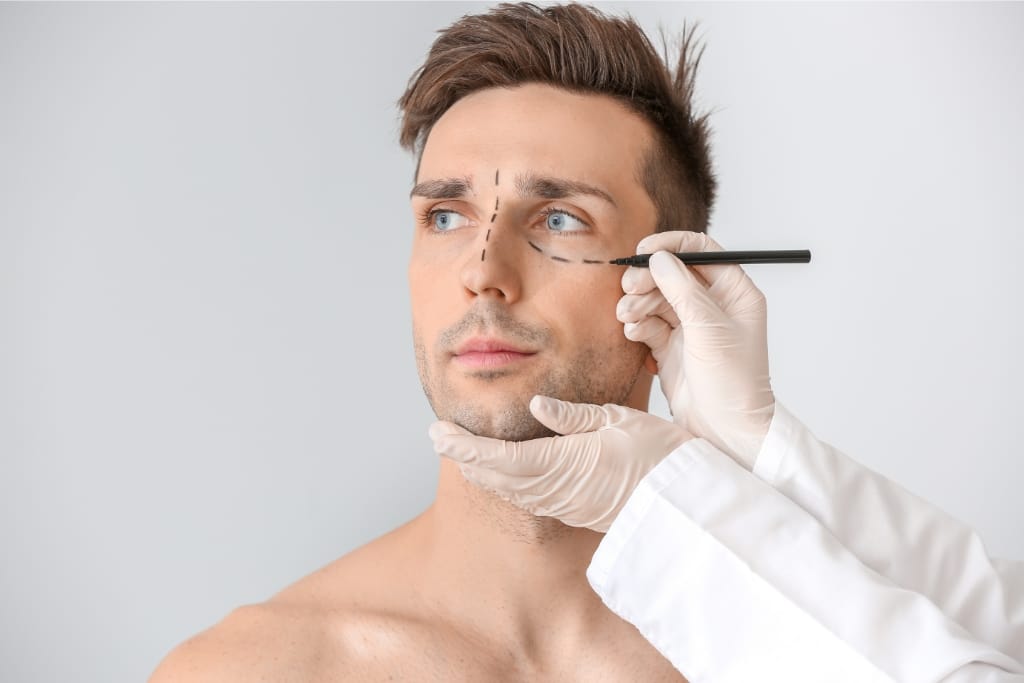Choosing a cosmetic surgeon is a decision that should not be taken lightly.
Whether you are considering plastic surgery for aesthetic reasons or for medical purposes, finding the right surgeon can make all the difference in the outcome of your procedure.
With so many options available, it can be overwhelming to know where to start.
That's why we have put together this quick guide with 10 tips for finding the best cosmetic surgeons.
1)) Credentials And Certification
One of the most important factors to consider when choosing a cosmetic surgeon is their credentials and certification.
Make sure the surgeon is board-certified by a reputable organization such as the American Board of Plastic Surgery.
This ensures that they have undergone rigorous training and meet high standards of ethical conduct.
Tips for Verifying Credentials And Certification:
- Check Board Certification: Ensure the cosmetic surgeon is certified by the American Board of Plastic Surgery or an equivalent organization in your region.
- Research Training Background: Look into the surgeon’s educational history and residency training to confirm they have specialized training in cosmetic surgery.
- Verify Licenses: Check that the surgeon holds a valid medical license in your state or country, ensuring they are legally permitted to perform surgical procedures.
- Look for Memberships: Membership in professional organizations like the American Society of Plastic Surgeons can indicate a commitment to continuous education and adherence to industry standards.
- Review Disciplinary Records: Search state medical boards to see if the surgeon has any history of malpractice claims or disciplinary actions.
- Inquire About Hospital Privileges: Having operating privileges at accredited hospitals often indicates that the surgeon meets the hospital's credentialing criteria.
- Seek Multiple Opinions: Don’t hesitate to consult with several surgeons to compare credentials and get multiple professional opinions.
- Read Reviews and Testimonials: Patient reviews and testimonials can provide insights into the surgeon’s expertise, patient care, and results.
- Ask for Before and After Photos: Viewing the surgeon’s previous work can help you gauge their skill level and the quality of their work.
- Schedule a Consultation: During your consultation, ask specific questions about the surgeon's experience with the procedure you are considering and observe their communication style and willingness to answer questions.
Verifying the credentials and certification of a cosmetic surgeon is an essential first step in ensuring your safety and satisfaction with the surgical outcome.
By thoroughly researching and confirming these key factors, you can be more confident in your choice, paving the way for a successful and positive experience.
Always prioritize board certification, proper training, and a clean professional record to make an informed and wise decision.
2)) Experience And Specialization
Look for a surgeon who has experience in performing the specific procedure you are interested in.
A surgeon who specializes in breast augmentation may not be the best choice for rhinoplasty, for example.
Ask about their experience with similar cases and request before and after photos to assess their results.
Tips for Evaluating Experience And Specialization:
- Check Procedure-Specific Experience: Verify how many times the surgeon has performed the specific procedure you are considering to ensure they have ample experience.
- Review Success Rates: Ask for statistics or data on the success rates of the procedures performed by the surgeon.
- Request Before and After Photos: Compare before and after photos of patients who have undergone the same procedure to assess the surgeon’s skill and aesthetic style.
- Ask About Complications: Inquire about any complications the surgeon has encountered with similar procedures and how they managed them.
- Look for Specialized Training: Ensure the surgeon has specialized training or fellowships in the procedure you are interested in.
- Ask for Procedural Details: Understand the specifics of how the surgeon plans to perform your procedure, as different surgeons may use different techniques.
- Seek Out Patient Testimonials: Look for reviews and testimonials from patients who had the same procedure done to gauge their satisfaction.
- Attend Educational Seminars: Some surgeons offer seminars or informational sessions about their specialty procedures, which can help you get more acquainted with their expertise.
- Consultation Questions: Prepare a list of detailed questions to ask during your consultation, focusing on their specific experience related to your desired procedure.
- Verify Continuous Education: A good surgeon stays updated with the latest techniques and technologies through continuous education and training in their field of specialization.
Selecting a cosmetic surgeon with the right experience and specialization is crucial to achieving your desired outcomes.
By focusing on their specific expertise, reviewing their past work, and understanding their procedural techniques, you can ensure that you are in capable and knowledgeable hands.
Comprehensive research and careful consideration of these aspects will significantly enhance your confidence and satisfaction with the surgical process and its results.
3)) Reputation And Reviews
Research the surgeon's reputation by reading reviews from previous patients online.
Look for testimonials on their website or social media pages, as well as third-party review sites like RealSelf or Healthgrades.
Pay attention to any negative feedback and how the surgeon responds to it.
Tips for Evaluating Reputation And Reviews:
- Read Online Reviews: Check review sites like RealSelf, Healthgrades, and Google Reviews for feedback from previous patients.
- Visit Social Media Pages: Look at the surgeon's presence on platforms like Facebook, Instagram, and LinkedIn for testimonials and patient interactions.
- Check the Surgeon’s Website: Review any patient testimonials or case studies provided on the surgeon’s official website.
- Consider the Overall Sentiment: Pay attention to the overall tone of the reviews and whether most patients report positive or negative experiences.
- Note Recurring Themes: Look for common themes in the reviews, such as consistent praise for specific skills or recurring complaints.
- Evaluate the Response to Criticism: Observe how the surgeon or their team responds to negative feedback to gauge their professionalism and commitment to patient satisfaction.
- Ask for References: Request to speak with past patients who are willing to share their experiences directly.
- Research Professional Endorsements: Look for endorsements or recognitions from other professional or medical organizations.
- Join Online Forums: Participate in forums or online communities related to cosmetic surgery to gather unbiased opinions and advice.
- Be Wary of Extremes: Be cautious of reviews that seem excessively positive or negative, as they may not be entirely genuine.
Evaluating the reputation and reviews of a cosmetic surgeon is a fundamental step in your decision-making process.
By thoroughly investigating patient feedback, observing how the surgeon handles criticism, and seeking unbiased opinions, you can gain valuable insights into the surgeon’s professionalism and quality of care.
This comprehensive approach will enable you to make a more informed choice, ultimately contributing to a safer and more satisfying surgical experience.
4)) Consultation Process
Schedule consultations with multiple surgeons to get a feel for their bedside manner and communication style.
A good surgeon will take the time to listen to your concerns, answer your questions thoroughly, and provide realistic expectations for your results. Trust your instincts during these meetings.
Tips for the Consultation Process:
- Prepare Questions in Advance: Write down any questions or concerns you have before your consultation to ensure you cover all important points.
- Observe Communication Skills: Pay attention to how well the surgeon listens to you and whether they provide clear, comprehensive answers.
- Assess Bedside Manner: Evaluate whether the surgeon makes you feel comfortable and confident in your care.
- Discuss Realistic Expectations: Ensure the surgeon provides honest and realistic expectations about potential outcomes and any risks associated.
- Ask About Previous Experience: Inquire about the surgeon’s experience with procedures like the one you are considering, including their success rates.
- Understand the Procedure Details: Ask the surgeon to explain the procedure step-by-step, including pre-operative preparations and post-operative care.
- Review Before and After Photos: Request to see before and after photos of previous patients who had similar procedures.
- Discuss Recovery Time: Get detailed information on recovery time, including any lifestyle modifications or downtime required.
- Evaluate Office Staff and Environment: Note how the office staff treats you and the cleanliness and professionalism of the office environment.
- Trust Your Instincts: Your comfort level and trust in the surgeon are crucial; trust your instincts when deciding if they are the right fit for you.
A thorough consultation process is essential for establishing trust and ensuring that your surgeon understands your goals and concerns.
By preparing questions, evaluating communication skills, and assessing previous work, you can make an informed decision about who will perform your procedure.
Trusting your instincts and feeling comfortable with your surgeon will significantly contribute to a positive surgical experience and satisfactory results.
5)) Facility Accreditation
Ensure that the surgical facility where the procedure will take place is accredited by an organization like AAAASF or AAAHC.
This means that the facility meets strict safety standards and has been inspected regularly by independent authorities.
Tips for Confirming Facility Accreditation:
- Verify Accreditation: Check whether the facility is accredited by recognized organizations such as AAAASF (American Association for Accreditation of Ambulatory Surgery Facilities) or AAAHC (Accreditation Association for Ambulatory Health Care).
- Ask the Surgeon: Directly ask your surgeon about the facility's accreditation status and what safety standards they adhere to.
- Look for Certification: Ensure that the facility has visible certification displayed or available for review upon request.
- Research the Accrediting Bodies: Familiarize yourself with the accrediting bodies' standards to better understand what the accreditation entails.
- Inspect the Facility: During your consultation, pay attention to the cleanliness, organization, and overall condition of the facility.
- Ask About Emergency Protocols: Inquire about the facility's emergency protocols and the availability of emergency medical equipment.
- Check for Regular Inspections: Ensure that the facility undergoes regular inspections and maintains its accreditation status through periodic reviews.
- Read Patient Reviews: Look up reviews from past patients about their experiences at the facility to gauge its reputation.
- Inquire About Staff Qualifications: Confirm that the medical and support staff at the facility are licensed and qualified for their roles.
- Verify Hospital Affiliations: If applicable, check whether the facility has affiliations with reputable hospitals in case of complications requiring hospital care.
A thorough review of facility accreditation is vital to ensuring a safe and successful surgical procedure.
By verifying accreditation, researching certifying bodies, and inspecting the facility, you can ensure that the environment meets high safety standards.
Understanding emergency protocols and assessing staff qualifications will further enhance your confidence in the facility's capability to provide excellent care.
Taking these steps will contribute to a safer and more reassuring surgical experience.
6)) Technology And Techniques
Inquire about the technology and techniques used by the surgeon during procedures.
Look for a surgeon who stays up-to-date on advancements in cosmetic surgery, as this can lead to safer procedures, faster recovery times, and better results.
Tips for Evaluating Technology and Techniques:
- Research Modern Techniques: Familiarize yourself with the latest techniques in cosmetic surgery to understand what options are available and what might be best for you.
- Inquire About Equipment: Ask the surgeon about the types of equipment they use and whether it represents the latest technology in the field.
- Ask About Training: Ensure that the surgeon and their team have received training on the latest technologies and techniques.
- Look for Minimally Invasive Options: Discuss potential minimally invasive techniques that could offer less risk and faster recovery times.
- Review Outcomes: Check for studies or data that show the outcomes of specific technologies and techniques.
- Request Demonstrations or Videos: Ask the surgeon to provide video demonstrations of the techniques they use to better understand the procedures.
- Discuss Benefits and Risks: Have a thorough conversation about the benefits and risks associated with the technology and techniques the surgeon uses.
- Understand Healing Times: Inquire about how the chosen technology and techniques impact healing and recovery times.
- Evaluate Case Studies: Review case studies or patient testimonials about the technology and techniques the surgeon employs.
- Seek a Second Opinion: Consider getting a second opinion to compare different surgeons' use of technology and techniques.
A comprehensive evaluation of the technology and techniques used in your surgical procedure is essential for achieving the safest and most effective outcomes.
By researching modern techniques, querying about the equipment, and understanding the training of your surgical team, you can gain confidence in the quality of care provided.
Discussing the benefits and risks, along with healing times, ensures you are well-informed and prepared for the surgical experience.
Taking these proactive steps will contribute to a smoother, more reassuring journey to achieving your cosmetic goals.
7)) Personalized Treatment Plans
Choose a surgeon who creates personalized treatment plans based on your unique needs and goals.
Avoid one-size-fits-all approaches that do not take into account your individual anatomy or desired outcome.
Tips for Developing Personalized Treatment Plans:
- Schedule a Comprehensive Consultation: Ensure that your initial consultation includes a detailed discussion of your medical history, lifestyle, and cosmetic goals.
- Discuss Your Expectations: Clearly communicate your desired outcomes and make sure the surgeon understands your vision.
- Evaluate Customized Approaches: Ask the surgeon how they will tailor the procedure to suit your unique anatomy and goals.
- Review Before-and-After Photos: Look at before-and-after photos of patients with similar body types to gauge what personalized results you can expect.
- Understand the Process: Inquire about the steps involved in creating and implementing a personalized treatment plan.
- Ask About Alternative Options: Discuss any alternative approaches that might achieve similar results with potentially less risk or downtime.
- Consider Your Health: Ensure that the surgeon takes into account any pre-existing conditions or health concerns that might impact your treatment plan.
- Get a Second Opinion: Don't hesitate to get a second opinion to compare personalized treatment plans and choose the best option for you.
- Discuss Post-Operative Care: Make sure the treatment plan includes detailed post-operative care instructions tailored to your needs.
- Evaluate Long-Term Plans: Discuss how the treatment plan fits into your long-term cosmetic goals and any future procedures you might consider.
Creating a personalized treatment plan is crucial for achieving the best possible outcomes tailored to your unique needs and goals.
By having in-depth consultations, evaluating customized approaches, and discussing your expectations, you ensure that the surgical procedure is specifically designed for you.
Considering alternative options, understanding the process, and reviewing post-operative care will further bolster your confidence in the plan.
Remember, a thorough and tailored approach not only enhances your surgical results but also ensures a safer and more satisfying journey toward your cosmetic aspirations.
8)) Cost transparency
Discuss pricing upfront with each potential surgeon to avoid any surprises later on.
Be wary of surgeons who offer unusually low prices or try to upsell unnecessary procedures or products.
Tips for Ensuring Cost Transparency:
- Request a Detailed Estimate: Ask for a comprehensive written estimate that breaks down all costs associated with the procedure.
- Understand What's Included: Clarify which services and follow-up visits are included in the quoted price and which are not.
- Inquire About Payment Plans: Ask if the surgeon offers financing options or payment plans that can make the procedure more affordable.
- Compare Prices: Get quotes from multiple surgeons to understand the average cost and what is considered standard for your procedure.
- Avoid Hidden Fees: Prompt the surgeon to disclose any potential additional costs that may arise during or after the surgery.
- Ask About Insurance: Confirm whether any part of the procedure is covered by insurance, and if so, what the steps are to get it approved.
- Clarify Refund Policies: Understand the surgeon’s refund policies in the event of complications or dissatisfaction with the results.
- Beware of Discounts: Be cautious of offers that seem excessively cheap, as they may compromise on quality and safety.
- Review Contract Terms: Carefully review the terms and conditions of any contract or agreement before signing.
- Document Everything: Keep copies of all estimates, contracts, and receipts for your records and future reference.
Transparency in cost is essential to ensure that you are fully aware of the financial commitment involved in your surgical procedure.
By requesting detailed estimates, understanding included services, and comparing prices, you protect yourself from unexpected expenses.
Inquiring about payment plans, insurance coverage, and refund policies further strengthens your financial planning.
Vigilance against hidden fees and overly attractive discounts ensures that quality and safety are not compromised.
Clear communication and documented agreements provide peace of mind and help you make well-informed decisions regarding your cosmetic goals.
9)) Post-Operative Care
Inquire about what post-operative care will be provided by the surgeon after your procedure.
A good surgeon will follow up with you regularly, monitor your progress, and address any concerns that may arise during recovery.
Tips for Effective Post-Operative Care:
- Follow Instructions Exactly: Adhere strictly to all post-operative care instructions provided by your surgeon to promote proper healing.
- Attend Follow-Up Appointments: Make sure to attend all scheduled follow-up visits so your surgeon can monitor your recovery progress and address any issues.
- Take Prescribed Medications: Ensure you take all prescribed medications, including pain relievers and antibiotics, as directed to manage pain and prevent infection.
- Rest and Refrain from Strenuous Activities: Allow your body ample time to heal by avoiding heavy lifting and strenuous activities until your surgeon gives you the all-clear.
- Maintain a Healthy Diet: Consume a balanced diet rich in vitamins and minerals to support your body's healing process.
- Stay Hydrated: Drink plenty of water to keep your body hydrated and assist in the healing process.
- Keep the Wound Clean: Follow your surgeon's instructions on how to care for and clean the surgical site to minimize the risk of infection.
- Monitor for Signs of Complications: Be vigilant in watching for any signs of infection, unusual swelling, or other complications, and report them to your surgeon immediately.
- Avoid Smoking and Alcohol: Refrain from smoking and consuming alcohol, as these can interfere with your body's ability to heal.
- Ask for Help: Do not hesitate to seek help from friends or family for daily tasks, ensuring you get adequate rest and avoid unnecessary strain.
Effective post-operative care is essential for a smooth and successful recovery process.
By diligently following your surgeon's instructions, attending follow-up appointments, and taking prescribed medications, you enhance your body's ability to heal properly.
Ensuring a healthy lifestyle, including a balanced diet and sufficient hydration, further supports recovery.
Staying vigilant for any signs of complications and adopting habits that promote healing, such as avoiding smoking and alcohol, are crucial steps.
With the right care and support, you can achieve optimal results from your surgical procedure.
10)) Follow-Up Appointments
Make sure that the surgeon offers follow-up appointments after your procedure to ensure proper healing and long-term satisfaction with your results.
Tips for Maximizing Follow-Up Appointments:
- Schedule Timely Appointments: Book your follow-up appointments as recommended by your surgeon to monitor your progress and catch any potential issues early.
- Prepare Questions in Advance: Jot down any questions or concerns you have before your appointments to ensure you address all your queries during the visit.
- Bring a Companion: Consider bringing a friend or family member to your appointments to help you remember the surgeon’s advice and provide support.
- Document Progress: Keep a journal or take photos of your healing progress to share with your surgeon during follow-ups for a comprehensive evaluation.
- Be Honest About Your Recovery: Communicate openly about your recovery experience, including any pain, discomfort, or unexpected changes.
- Follow Advice Given: Adhere to any additional instructions or adjustments to your care plan provided during follow-up visits.
- Discuss Long-Term Care: Talk about any long-term care or maintenance that might be needed to ensure lasting results from your procedure.
- Address Any Concerns Immediately: If you notice complications or have serious concerns before your scheduled follow-up, contact your surgeon promptly instead of waiting.
- Clarify Future Appointments: Confirm the frequency and schedule of future follow-up visits to stay on track with your recovery plan.
- Keep Records: Maintain notes and records from each appointment for future reference and to ensure continuity in your care.
Consistent follow-up appointments play a pivotal role in ensuring the success and longevity of your surgical results.
By scheduling timely visits, preparing questions, and communicating openly with your surgeon, you can address any issues early and make necessary adjustments to your care plan.
Bringing a companion, documenting progress, and maintaining honest communication further enhance the effectiveness of your follow-up care.
In addition, discussing long-term care ensures that your results are maintained over time.
With diligent follow-up and thorough communication, you can achieve the best possible outcomes and enjoy long-term satisfaction with your procedure.
Conclusion
The journey to recovery and long-term satisfaction following any surgical procedure is significantly enhanced by diligent post-operative care and consistent follow-up appointments.
By adhering to the detailed tips provided—such as following your surgeon's instructions, maintaining a healthy lifestyle, scheduling timely follow-up visits, and communicating effectively—you can ensure that your body heals properly and complications are minimized.
The support from companions and the proactive monitoring of your progress contribute to a smoother recovery process.
The combination of effective post-operative care and regular follow-up appointments sets the foundation for achieving optimal surgical outcomes, leading to greater satisfaction and improved long-term health.
Related Articles and Guides
- How To Choose A Good Cosmetic Surgeon
- How To Negotiate The Best Price For Cosmetic Surgery
- 10 Tips To Help You Determine Whether To Fire And Replace A Cosmetic Surgeon
Download Our Free E-book!








